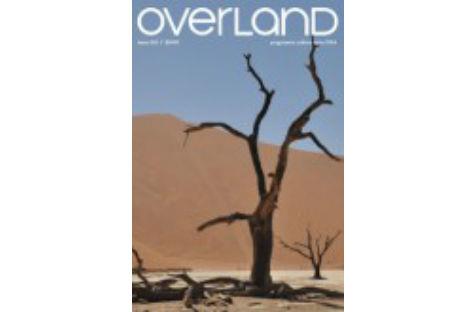Overland editor Jeff Sparrow kick-starts the journal with a quote from Anglo-American poet W.H. Auden:
When Statesmen gravely say, ‘We must be realistic’,
The chances are they’re weak and, therefore, pacifistic,
But when they speak of Principles, look out: perhaps
Their generals are already poring over maps
While the poem evokes war’s outrageous violations of human rights under the guise of humanitarianism, Sparrow suggests that the rhetoric of interventions and ‘clashes of civilisations’ may have been superseded by different, yet no less pressing, dilemmas.
“Our contributors focus on the most pressing issues of the era, from environmental crisis to the resurgence of fascism, and from the war on terror to the oppression of Tibet.”
In Zero Dark Geronimo, Californian writer Aaron Bady expounds upon the inherent problems with Hollywood’s latest offering Zero Dark Thirty, all the while pondering on America’s ubiquitous search for the next Great American Novel which has intensified in the aftermath of September 11. Although objections to Zero Dark Thirty have been widely voiced through opinions pieces in broadsheets, blogs and online publications, Bady injects the debate with the introduction of the idea that films such as Zero Dark Thirty – rather than literature – most expertly ‘capture the experience of being after September 11’.
‘I don’t call Zero Dark Thirty the great September 11 film because it gives us any particular insight into torture, terrorism or the hunt for Osama bin Laden; the film tells us nothing new except the many details it gets wrong. And I don’t call it the great September 11 film because I like it.’
In the more personal accounts of the journal, Francesca Rendle-Short pens a beautiful field guide tribute towards her father, while Alyena Mohummadally shows us how it is possible to reconcile her position as a young lesbian woman with that of her Muslim identity
Catapulting readers further abroad to Europe, Panagiotis Sotiris charts the dangerous rise of the right-wing extremist political party Golden Dawn in Greece with a resounding call for the Left and social movements to articulate a coherent alternative. Meanwhile, Kate Davison talks about the gradual dissipation in Germany’s unconditional solidarity with Israel and the significance of such a move when countered against the portentous cloud of the Holocaust.
‘What it showed us is that it was no longer possible in Germany for the accusation of anti-Semitism to be used to suppress legitimate criticism.’
Closer to home, Martin Kovan uses the case of the self-immolation of English Buddhist monk Venerable Tunden in southern France – the first time a non-Tibetan has set themselves aflame in the context of the Tibetan human rights’ violations – as proof that the Tibetan humanitarian crisis is a crisis of global conscience.
On a local front, Philip Mirowski, Jeremy Walker and Antoinette Abboud expertly discuss why the Left is consistently blindsided by climate change policy, while Guy Rundle touches on total surveillance, the “hackerati” and the future of activism in a highly compact and, at times, dense piece. Regular Overland columnist Alison Croggon’s On Mingled Sorrow and Joy is a delight to read as she capitulates once again to the wonders of Tolkien’s The Lord of the Rings.
Both touching on the distinct cultural follies and misappropriation of the arts industry are Rjurik Davidson and Dean Biron. Davidson decries the profound silence in Anglophone films on successful left-wing resistance movements and how history is inadvertently rewritten in releases such as Defiance, Schindler’s List and Charlotte Gray.
And in one of the most interesting pieces of the journal, Biron uses Rowan Woods’ film The Boys as a focal point to which he discusses the insular, deeply conservative and hypocritical tendencies of Australians when it comes to their enjoyment and assessment of the arts – symptomatic of a more troubling chasm in the Australian psyche.
‘The persistent lack of tolerance for otherness in art, in film and television, and especially in music, reveals a hidden defect in the Australian way of life that is as ubiquitous as it is disturbing.’
Interspersed throughout the journal are two memorable pieces of fiction – Theresa Layton’s The Cartography of Foxes and Andres Vaccari’s American Djinn. The former very much encapsulates the essence of Australian literature with its juxtaposition of the beauty and terror of life in the Australian bush, while the latter transports readers to the war-ravaged sandy dunes of the Middle East as the protagonist searches in vain for ghost sightings.
Leading Australian poet and scholar Peter Minter highlights the importance of an “honest and well-crafted” poem, as he deliberates on his reasons behind awarding the 2012 Judith Wright Poetry Prize for New and Emerging Poets to the various place-winning poems. Winning poem ‘Augury?’ is a particular highlight, with its meandering lines punctuated by evocative descriptors and barely concealed subtexts.
In his editorial, Sparrow warned that the many problems facing us may seem overwhelming as no obvious solutions present themselves. However by fostering such important discussions on the pressing challenges that underline the fabric of our society, journals such as Overland dictate the overall tone of national dialogues and provide us with much-needed facts and well-articulated analysis.
Rating: 4 stars out of 5
Overland #210 Autumn 2013
Published by the OL Society Limited
Paperback, 95 pp, $19.95
Edited by Jeff Sparrow





